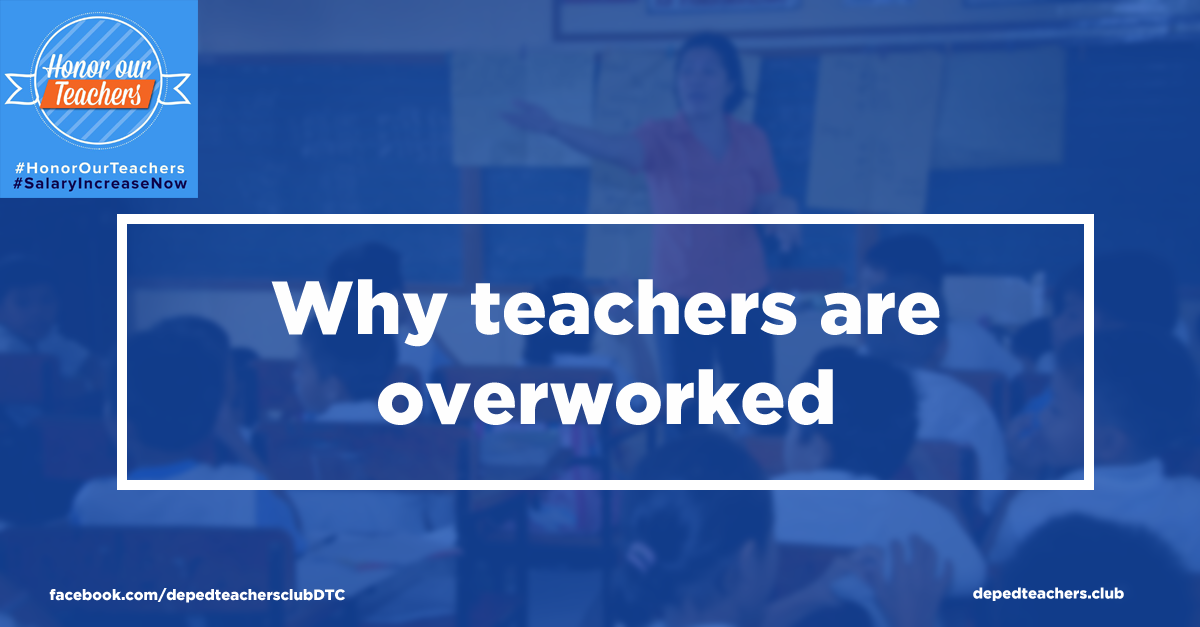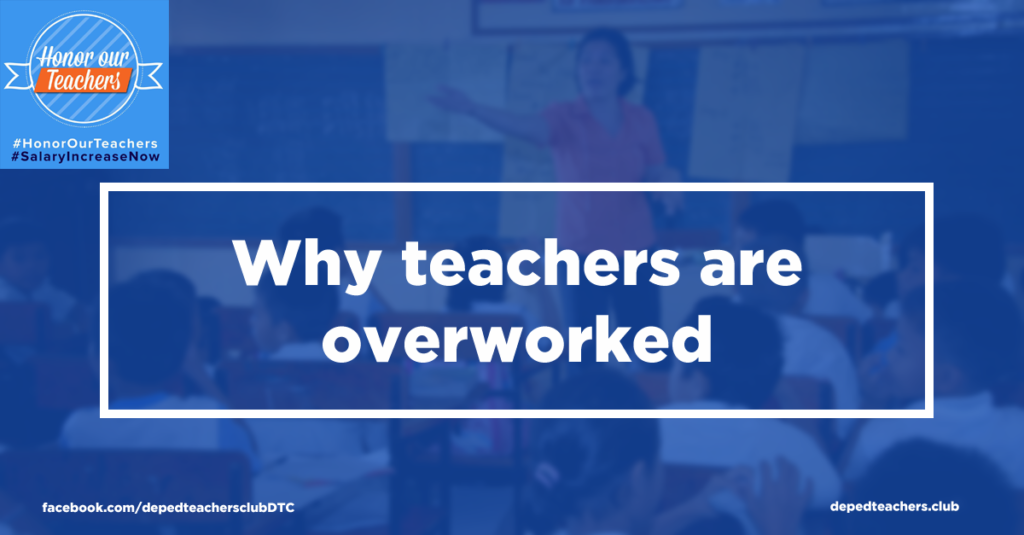
Why teachers are overworked
The Filipino teachers grieve the demise of some of our colleagues of late. While some would argue that they have their own circumstances, there is no denying that, in one way or another, their working conditions have something to do with their untimely deaths. In any profession, work condition is a major factor to one’s physical and psychological well-being.
The teachers’ workload has become more and more burdensome over the years. Implementation of policies that demand greater effort and non-implementation of those that secure ample rest have wrung the labor power out of our mentors’ beings. A bill filed by ACT Teachers Partylist is pending in Congress to seek the lowering of teachers’ retirement age to 55 years old, as in the uniformed personnel. Whatever the fate of the progressive bill maybe, the sources of teachers’ overwork should be addressed and eliminated.
1. Pathetic number of education support staff
In 2006, the rationalization program implemented in the Department of Education had effectively abolished about 6,000 non-teaching items. This shrank further the already scant number of education support staff. In 2017, the ratio of DepEd non-teaching staff to teachers is at 1:18 while the ratio of non-teaching staff to students is even worse at 1:658. Each staff only perform specialized duties as doctors, nurses, guidance counselors, or librarians. Ratios in the school-level are more pitiful as most of these education support personnel are assigned in the DepEd national, regional and division offices. The handful of contractual maintenance personnel whose salaries are paid for by the local government units or parents associations could not even cover the general upkeep of school premises. As such, our teachers are forced to wear a variety of hats in school—registrar, clerk, librarian, nurse, guidance coordinator, custodian, security guard, and janitor.
2. Shortages worsened by the K-12 program
The addition of grade levels under the K-12 program without foresight and preparation has scattered thinly the already stretched teaching workforce. This has caused the ballooning of class size, which entailed heavier demands on teachers, both in actual teaching and other teaching-related duties such as checking of student work, computation of grades, monitoring student development, relating to parents/guardians, etc. There are huge gaps between the number of classrooms, instructional materials, instructional facilities, and non-teaching personnel needed and the existing ones.
3. Taxing K to 12 Curriculum in Outcomes-based Education Framework with Lacking Instructional and Learning Materials
Five years after the K to 12 Law was passed, textbooks in a number of Grade levels are still lacking or the ones available are unusable. In the senior high school grades, DepEd has yet to provide modules and instructional materials for teachers. While teachers take the extra effort of finding suitable materials for their use and their students’, the experimental curriculum frustrates them as learning seems to be more difficult for students. Not a few teachers lament of having Grade 5 and 6 students who are still non-readers. The situation requires extra time and effort from teachers to hold special reading sessions. The outcomes-based education framework also banks heavily on student output in the form of numerous reports and projects that taxes teachers with lots of checking time instead of focusing on the improvement of pedagogy and monitoring learners’ development.
4. Oppressive Result-based Framework in Evaluation and Performance-based Bonuses and Benefits
Through the recommendation of the Asian Development Bank, the state employed the results-based framework in government operations which follows the private sector’s formula for efficiency. The paradigm works on the premise of exploiting labor to the hilt at a minimum cost. From which stemmed the Result-based Performance Management System which burdened teachers, and the even more oppressive Philippine Professional Standards for Teachers which is now being rolled out in schools. Both strain teachers with an amount of paperwork good enough to occupy fulltime staff. The evaluation system that is based on an array of modes of verification requires teachers to accumulate documents, artifacts, and certificates to prove the duties they performed. It passes on to the teachers the blame and the responsibility for quality education while budget, facilities, and support are sorely lacking. Mentors, on the other hand, are hostages by the policy as benefits and bonuses, as well as promotion depend on the thickness of their portfolio.
5. Non-implementation of 84 Days Proportional Vacation Pay and 10-Day Restriction on Service Credits
The 84 days Proportional Vacation Pay (PVP) is a myth. Teachers are not entitled to sick leave, vacation leave, birthday leave, and special purpose leave benefits guaranteed by labor laws. What they have instead is PVP during summer and Christmas breaks. The 84 days provision is misleading as it counts even the weekends which are non-working days for all government employees. Teachers’ summer vacation is eaten up, still, by paper works, summer reading camp, seminars, meetings, and Brigada Eskwela. Many weekends during the school year, they are asked to come to school for meetings, parents-teachers conferences, preparation for school activities and programs, and many others. All the extra days of work, however, could not be recompensed as they can only apply for service credits of up to 10 days per year. The excess days they rendered service are just listed as sacrifices, but are actual days and time lost for ample rest and quality family time.
These difficult conditions take a toll on our teachers. It is high time that the government recognize that teachers are human beings that are entitled to basic labor rights. Not a few of our teachers suffer from exhaustion and work-related ailments. The need to be liberated from such oppressive policies and inhumane working conditions is urgent and imperative.
The government has to do some serious rethinking about the K-12 program as obviously, it does more harm to the teachers, the students, and the nation than good. The result-based framework in government operations should be abandoned as it works on exploitative structures and does not fit the public character and service orientation of the state. Policies that deprive teachers of sufficient rest should be junked while affirmative actions should be done to bring dignity to the teaching profession. As the Congress deliberates today on the 2019 national budget, sufficient budget shall be allotted to address the shortages in the education system. Items for education support staff should be created. More teachers should be hired. Ample allocations should be made for maintenance and other operating expenses to fill in the deficiencies in facilities, equipment, and materials. Most importantly, teachers should be justly compensated for their work’s worth. Enough budget should be allotted for substantial salary increase, benefits, and promotion.
#HonorOurTeachers

Leave a Reply